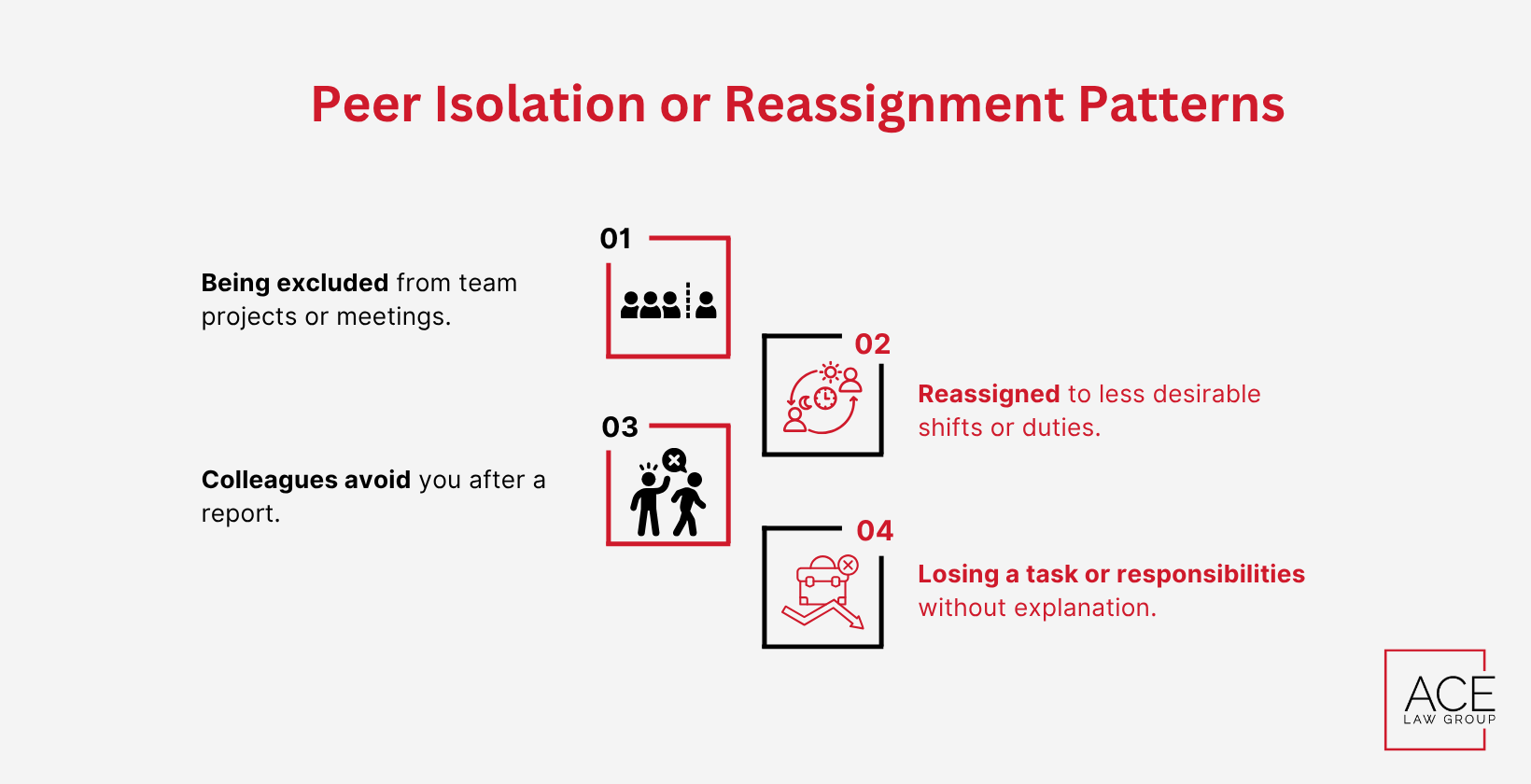Retaliation at work happens when an employer punishes you for asserting your legal rights, like reporting harassment, safety issues, or discrimination. This includes demotion, isolation, cut hours, or even wrongful termination. In Las Vegas, many workers face serious pushback just for doing the right thing.
Proving retaliation requires more than just your word. You need to establish a clear connection between your protected action and the adverse treatment that followed. This often involves timelines, documentation, and comparisons to how others were treated in similar situations.
Your job, your well-being, and your future matter. The law is on your side, and knowing your rights is the first step toward holding your employer accountable.

Step-by-Step Guide to Proving Workplace Retaliation
You do not need a law degree to prove workplace retaliation. You need facts, timelines, and consistent documentation. These five steps help you stay organized and build a case your employer can not easily deny.
Step 1: Document the Protected Activity You Engaged In
To prove retaliation in the workplace, you must document the protected activity you engaged in.
This includes reporting harassment, filing a formal complaint, or requesting medical leave. Write down what happened, who was involved, and when it occurred. Be specific, include dates, emails, or HR reports.
This record is the legal foundation of your retaliation claim. Without it, proving employer misconduct becomes far more difficult.
Step 2: Record All Adverse Employment Actions
To support your retaliation claim, track each negative job action that followed your complaint.
These actions often include: demotion, reduced hours, disciplinary write-ups, and termination.
Write down what happened, who made the decision, and when it occurred. If your manager provided a reason or made a comment, include that as well.
Clear, dated records of these actions will strengthen your retaliation claim.
Step 3: Establish a Timeline to Show Causation
Your retaliation case becomes stronger when the timeline clearly links your complaint to your employer’s response.
Place each event in order: when you filed your complaint, when the behavior shifted, and when formal action was taken.
A short time gap of days or weeks between your complaint and retaliation strengthens your claim. Write down each action with exact dates. Timing matters more than assumptions.
Step 4: Preserve Emails, Reviews, and Witness Statements
Strong documentation, emails, reviews, and statements can give your claim legal weight. This includes:
- Emails from supervisors.
- Performance reviews with unexpected negative feedback.
- Text messages from HR.
- Coworker statements confirming what they saw or heard.
Keep both digital and physical copies in a secure location. Clear, dated documentation builds credibility and helps prove employer retaliation.
Step 5: Show How Others Were Treated Differently
A valid retaliation claim often hinges on showing how your treatment differed from others in similar roles.
If others in your same role kept their hours, received bonuses, or avoided discipline, while you were punished, that difference matters.
This disparity in treatment strengthens your retaliation claim. Focus on coworkers who did not file complaints and document how their experience differed from yours.
What Counts as Workplace Retaliation?
Workplace retaliation becomes illegal when it follows a protected activity and results in a negative job action. What qualifies and how it’s proven depends on the law. Here’s what you need to know.
Legal Definition Under Federal and Nevada Law
The law defines retaliation as a negative response to a protected action, requiring a clear cause-and-effect link.
Federal laws like Title VII, ADA, ADEA, and FMLA protect workers who report discrimination, request accommodations, or take approved medical leave.
Nevada law offers similar protections.
To prove retaliation in the workplace, you must show that your employer took a clear negative action, such as demotion, firing, or pay cuts, because of your protected activity.

Protected Activities That Trigger Retaliation Coverage
Protected activities are legally recognized actions that shield workers from employer retaliation.
The most common include:
- Reporting workplace discrimination or harassment to HR or a supervisor.
- Filing a complaint with the EEOC or the Nevada Equal Rights Commission.
- Participating in a workplace investigation or lawsuit.
- Requesting accommodations under the ADA.
- Taking protected medical leave under the FMLA.
- Reporting safety violations to OSHA or a state labor agency.
- Speaking up about wage theft, misclassification, or similar violations.
Subtle Forms of Retaliation You Might Miss
Subtle workplace retaliation includes quiet shifts in how you are treated after speaking up.
These may include:
- Being excluded from meetings you once led.
- Removed from project emails without explanation.
- Given harsher scrutiny or rule enforcement.
- Denied growth opportunities that others receive.
- Micromanage tasks you previously handled independently.
These patterns may seem small alone, but together they show retaliation.
If you notice significant changes after filing a complaint, document each one. This type of retaliation still counts, and it can be just as damaging.
What Evidence Makes a Retaliation Claim Legally Strong?
A strong retaliation claim is built on consistent, documented facts, not a single piece of undeniable proof. Below are 4 types of evidence that carry weight with courts, investigators, and agencies.
Direct vs Circumstantial Evidence
Your claim can rely on two key types of evidence: direct and circumstantial.
- Direct evidence includes clear admissions, like an email stating you were demoted for filing a complaint.
- Circumstantial evidence reveals patterns, such as being written up days after reporting misconduct.
Most retaliation cases rely on circumstantial evidence, but collecting both strengthens your claim.
For example, if your hours were cut after testifying in an investigation, that timing itself can support your case even without a written reason.

Communication Logs and Performance Trends
Tracking how your manager communicates before and after a complaint can reveal patterns of retaliation.
Look for:
- Changes in tone.
- Negative performance reviews.
- Sudden criticism after previously positive feedback.
If your reviews shift right after you report a problem, that’s a red flag.
Emails, chat logs, and performance documents help show how your treatment changed and may strengthen your legal claim.
Behavior Shifts Before and After Complaints
Behavior changes after you speak up are one of the clearest signs of retaliation.
Track any shift in tone, access, or expectations. If a manager who praised your work starts criticizing minor issues or excluding you from meetings, that is a red flag.
In many retaliation cases, workers receive sudden write-ups for minor infractions that were never previously enforced.
Why Is It Hard to Prove Retaliation at Work?
Proving retaliation in the workplace often relies on patterns of behavior, not direct admissions.
You will not always find a clear statement or email confirming it. But with documentation and timing, workers frequently succeed.
Common Challenges in Retaliation Cases
- Lack of direct evidence, like emails or texts.
- Employer names performance issues.
- Delays between the complaint and retaliation.
- Coworkers fear backing your story.
- Retaliation disguised as “normal” policy enforcement.
Legal Burdens and Employer Defenses
To prove retaliation in the workplace, the law requires you to show a direct link between your complaint and the employer’s action.
This burden falls on you, not your employer.
Common defenses include blaming “poor performance” or citing team restructuring shortly after your protected activity.
Without documentation, these explanations can sound credible even when they are not. Track changes carefully to meet this legal burden.
How Employers Use Pretext to Hide Retaliation
A pretext is a false justification employers use to cover up retaliation after a complaint. It may sound legitimate, like performance issues or restructuring, but it does not hold up under legal scrutiny.
Pretext often appears when retaliation is disguised as routine discipline or policy enforcement. If you notice sudden criticism or demotion right after protected activity, patterns matter more than words.
Here are 4 common employer excuses and what actually happened:
| Employer Explanation | Actual Timeline |
| Your performance has declined. | You received positive reviews until the week after reporting harassment. |
| We are reorganizing the team. | Only you were removed, and it followed a complaint of discrimination. |
| You violated a new policy. | No one else was disciplined under this policy; it appeared after you spoke up. |
| The promotion went to someone more qualified. | You had seniority and higher reviews before filing a grievance. |
Why Retaliation Can Be Subtle and Still Illegal
Subtle changes in your work environment after a complaint may still count as illegal retaliation.
Retaliation does not always involve termination. It often shows up as exclusion from meetings, unexpected criticism, or changes in tone.
Courts recognize these behaviors when they create a hostile or unequal work environment.
It’s not just one moment; it’s the pattern that proves retaliation in the workplace.
When You Should Contact a Workplace Retaliation Lawyer
Contact a workplace retaliation lawyer when warning signs appear, even before formal retaliation escalates.
Early legal advice helps preserve evidence, avoid costly mistakes, and prevent further harm. If you notice these patterns, legal support can make the difference between proving your claim and watching it fade.
If HR Is Not Taking You Seriously
When HR ignores your complaints or delays action, it is a clear red flag in a retaliation case. No HR follow-up, slow investigations, or a dismissive tone during meetings often signal deeper organizational problems.
Document every interaction, emails, meeting notes, and written responses starting from the moment you file a complaint. HR inaction weakens your case unless you keep records. Legal support often prompts faster and more careful responses.
If Your Job or Health is at Risk
Retaliation that impacts your job or mental health is a legal warning sign and must be addressed quickly.
Stress, anxiety, or threats of termination often appear after filing a complaint.
These patterns escalate fast and can damage your long-term well-being. Our Las Vegas employment lawyer protects both your rights and your peace of mind.
If Retaliation Is Escalating or Ongoing
Repeated retaliation is a strong legal signal that your employer is escalating harm and your case is growing stronger.
Multiple write-ups, shift changes, or exclusions after filing a complaint often show a worsening pattern.
Each new act increases legal risk for your employer.
A Las Vegas workplace retaliation lawyer can step in, stop further damage, and help build a documented response.
What Laws Protect You from Workplace Retaliation?
Several state and federal laws protect workers from retaliation in the workplace after asserting their legal rights. Understanding these laws equips you to take action and strengthens your legal claim.
Title VII and Federal Anti-Retaliation Provisions
Title VII of the Civil Rights Act protects workers from retaliation in the workplace after reporting discrimination based on race, sex, religion, or national origin.
Other key federal laws include:
- FMLA: For medical leave retaliation.
- ADA: For disability accommodation retaliation.
- ADEA: For age discrimination cases (40+ workers).
These laws make it illegal for an employer to punish you for standing up for your rights. They form the core of most retaliation claims filed in the U.S.
State-Specific Protections and Whistleblower Laws
Nevada laws, such as NRS 613.340 and whistleblower statutes, give you the right to report misconduct without fear of retaliation.
These protections apply when you file a complaint, report illegal activity, or refuse to break the law even if no lawsuit is filed.
State retaliation protections often close gaps left by federal law. Use them to strengthen your workplace retaliation case.
Key Federal and State Retaliation Laws
| Law | What Does It Cover? | Retaliation Protected? |
| Title VII | Race, Sex, and Religious Discrimination | Yes |
| FMLA | Medical Leave Rights | Yes |
| ADA | Disability Accommodations | Yes |
| ADEA | Age Discrimination (40 and older) | Yes |
| OSHA (Nevada) | Workplace Safety Reports | Yes |
| NRS 613.340 | State-level Discrimination and Retaliation Claims | Yes |
| NRS 281.611–281.671 | Whistleblower Protection (Public Employees) | Yes |
Signs You May Be Facing Illegal Retaliation
Illegal retaliation in the workplace often begins subtly and escalates quickly. You may notice schedule changes, isolation, or criticism shortly after filing a complaint.
These are not coincidences; they are warning signs. The sooner you recognize them, the faster you can protect your job and legal rights.
Emotional and Psychological Changes
Workplace retaliation often affects your emotional well-being before it shows up in formal action.
After reporting harassment or filing a complaint, many workers experience changes in mood, energy, or confidence.
Watch for these signs:
- Anxiety before meetings or shifts.
- Feeling excluded or avoided by coworkers.
- Loss of confidence after new criticism.
- Dread or burnout related to work.
These emotional changes often reflect deeper retaliation patterns and should not be ignored.
Sudden Policy Shifts or Discipline
Sudden discipline and new rules after a complaint often signal workplace retaliation. If policies change right after you report misconduct, that shift may not be coincidental.
Look for these 4 signs:
- Write-ups with no prior warnings.
- Discipline for actions that others are not punished for.
- New rules apply only to you or your team.
- Expectations that were not discussed before.
These actions often follow protected complaints and reflect targeted retaliation.
Peer Isolation or Reassignment Patterns
Retaliation in the workplace is not always a managerial issue; it can also come from coworkers.
After you report discrimination or misconduct, subtle changes may appear in how peers treat you. These social shifts rarely involve job titles but can impact your morale and position.
Look out for:

Can You Sue for Retaliation at Work in Nevada
Yes, you can sue for retaliation at work in Nevada, but you’ll need to follow a legal process first. Most claims begin with filing a complaint with the EEOC or the Nevada Equal Rights Commission (NERC). If that fails, a lawsuit becomes your next step.
Here’s a simplified path many retaliation claims follow:
EEOC Complaint → Investigation → Lawsuit → Settlement/Trial
When a Lawsuit Becomes the Right Move
Filing a lawsuit for workplace retaliation is often the next step when harm becomes permanent, like job loss or emotional damage.
Many workers sue after receiving a “right to sue” letter from the EEOC or the NERC. Legal action can stop ongoing retaliation and help you recover lost income or emotional damages.
If your complaint didn’t resolve the issue, you have options.
Compensation You May Be Entitled to
You may be entitled to five types of compensation after workplace retaliation. These payments can cover both financial loss and personal suffering.
Here are the five types of damages commonly awarded:
- Back Pay: Wages and benefits lost due to termination or demotion.
- Front Pay: Future lost income when reinstatement is not possible.
- Emotional Distress: Compensation for anxiety, stress, or damaged reputation.
- Attorneys’ Fees: Legal costs paid by the employer if you win.
- Punitive Damages: Extra penalties for severe or intentional retaliation.
These forms of compensation aim to restore what you have lost and hold employers accountable.
Settlement vs. Trial: What to Expect
Most workplace retaliation claims are resolved through settlement, but not all should be.
Settlements offer faster, private resolutions. Trials take longer but may lead to greater compensation. Here are 5 key differences:
| Settlement | Trial |
| Faster resolution (months) | Slower process (1+ year) |
| Private outcome | Public court record |
| Less emotional stress | Higher emotional toll |
| Agreed terms | Jury decides outcome |
| Predictable compensation | Potential for higher damages |
At Ace Law Group, we prepare every retaliation case for trial while pursuing a fair settlement early, giving you options and leverage.
FAQs About Proving Retaliation at Work
Can I file a complaint without losing my job?
Yes, you can file a complaint without losing your job. It’s illegal for your employer to retaliate against you for reporting misconduct.
How long do I have to file a retaliation claim in Nevada?
You have 180 to 300 days to file a retaliation claim in Nevada. The deadline depends on whether you file with the EEOC or the Nevada Equal Rights Commission.
Is emotional distress part of retaliation damages?
Yes, emotional distress is part of retaliation damages. This includes compensation for anxiety, depression, or damage to your reputation caused by your employer’s illegal actions.
Speak With a Las Vegas Workplace Retaliation Lawyer Today
You are one step away from legal help for workplace retaliation in Las Vegas.
If you have been punished for reporting harassment, discrimination, or unsafe conditions, you are not alone. We have helped hundreds of Nevada workers get justice, from casinos to construction sites.
Your consultation is free, confidential, and guided by over 10 years of proven legal results. Let’s review what happened and talk through your next steps. No pressure, just honest advice.

Contact Ace Law Group today for a free case review. Local Support. Legal Clarity.